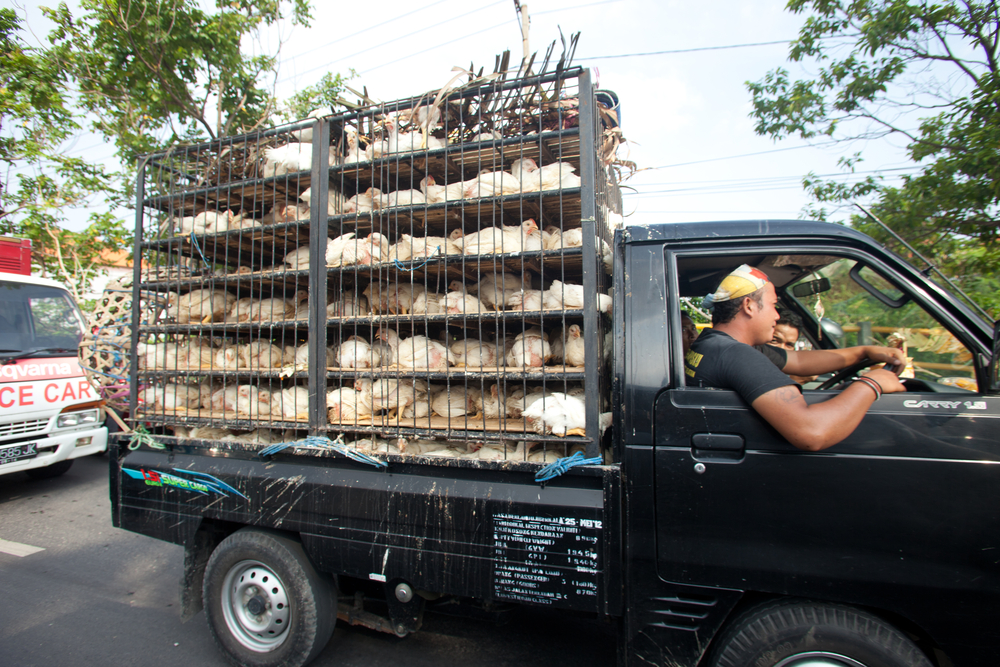
In a groundbreaking move toward corporate social responsibility, the United Egg Producers of the United States is teaming up with the Humane Society to push for regulations of its industry making the particularly cruel battery cages with which most chickens are factory farmed illegal.
Regulatory attempts like this are often stonewalled by the industry associations themselves, but in this case, there’s a different challenger – the pig and cow factory farm industries. Those industries will not be affected by this law one iota, and yet the National Pork Producers Council and the National Cattlemen’s Beef Association have teamed up to create a particularly vomit-inducing PR campaign under the banner of “Keep Food Affordable”. Why would the NPPC and the NCBA care about the chicken industry’s attempt to self-regulate and decrease the cruelty associated with its work?
While Keep Food Affordable (chuckle) cites that it is a body that represents citizens, industry, and workers, even the NPPC admits that the PR shenanigans are just about entirely funded by the NPPC. Follow the money, follow the logic…. if the NPPC is fighting another industry’s regulations, it is likely because it fears that they’re next.
And in fact, that is likely the case. Pig factory farms, which use crates to confine pigs during their entire, tortured existence, see the writing on the wall. They’re being sued by the Humane Society for violating clean air laws (as a roundabout way of trying to get them to stop using such confinement techniques, no doubt), and have had more and more restaurants pledge to stop serving their cruelty-laden products, including Burger King’s announcement that they’d stop using caged pork or chicken products by 2017.
Factory farms are on their way out, according to Erik Marcus, author of Meat Market, who recently gave a talk to the Vegetaarian Society of Hawaii called “The End of Factory Farming”. Factory farms, or CAFO’s, had long been assumed of causing antibiotic resistant bacteria which have leveled billions in costs to taxpayers as a major public health epidemic, and last year, the smoking gun, a direct link between factory farms and antibiotic resistant bacteria that plagues humans, was definitively found for the first time.
Nevermind the fact that industrial animal agriculture is one of the worst things for the planet.
Wouldn’t it be nice if the industry associations representing capitalism’s worst side were to be more proactive? It’s unfortunate, and their own damn fault, if you ask me, that they force taxpayers into a corner where finally a court has to order the FDA to start reigning in the damaging business practices of factory farms. But that’s where we’re at.
Further complicating matters, some in congress are trying to tack an amendment onto the Farm bill effectively taking away states’ rights to regulate the food they import from other states. Representative Steve King, Republican from Iowa, introduced Amendment 45, which, if it passes, would nullify California’s humane egg-rearing law passed several years ago. Odd, isn’t it? Republicans are usually all about states’ rights in the cases of environmental protection and public health, which effectively penalizes any state for trying to keep their air and water clean (think about it this way–Iowa, for instance, might want to regulate lead emissions from factories…by allowing states to set their own standards for air quality, a neighboring state can built a factory or power plant right next to the border and steal jobs and tax revenues from Iowa, thus making it difficult for any state to stamp out dirty energy subsidies, and effectively creating a Republican paradise). But for some reason when it comes to factory farming, they’re completely against states rights.
Open letter to the NPPC: take a cue from the United Egg Producers. By working with the Humane Society to raise the floor on the debate, the UEP is setting a standard by which all egg manufacturers must comply. With a regulation like that, the playing field is level, and yes, it may add a few cents to the cost of eggs, but it’ll be raised across the board. The net outcome will likely not decrease egg revenues. The biggest risk to the factory farms is that the extra few cents will help make locally grown eggs more cost-effective. But the impact of that is likely to be miniscule, and in the meantime, the organization helps its members create better business practices that employees don’t have to be ashamed of, and that are more palatable to the general public. Both of those things might drive revenue growth in the industry.
Follow Scott Cooney on Twitter.
Battery Cage photo: project1photography / Shutterstock.com









